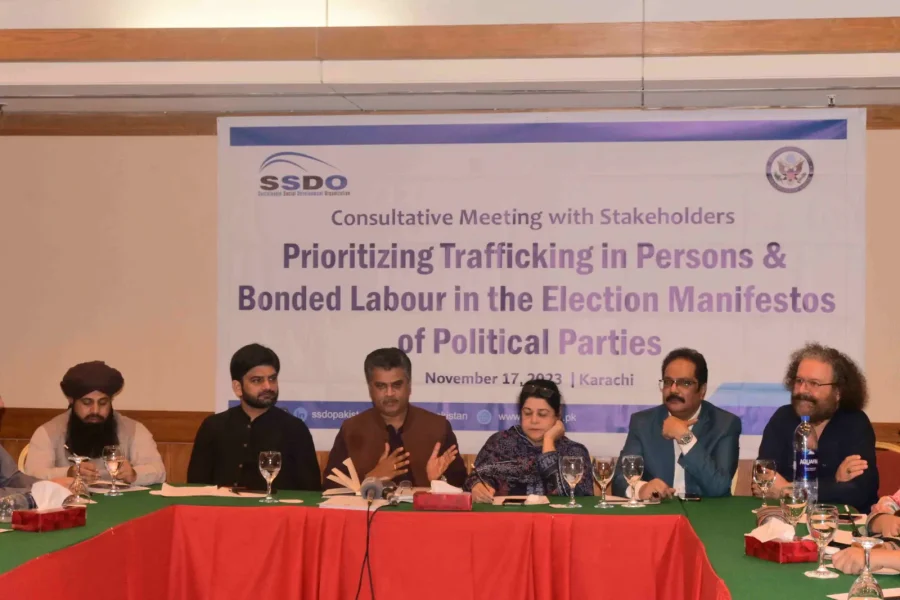Sustainable Social Development Organization (SSDO) has conducted a consultative session bringing together a diverse group of stakeholders to discuss and prioritize the critical issues of Trafficking in Persons (TIP) and bonded labour in the upcoming election manifestos of political parties in Pakistan. The session aimed to foster collaboration among various stakeholders, including representatives from civil society organizations, government agencies, human rights advocates, academics, and media members.
It provided a platform for open dialogue, knowledge sharing, and the development of actionable strategies to address the pervasive issues of Trafficking in Persons and Bonded Labour in Pakistan. SSDO in collaboration with the Sindh Human Rights Commission and US Embassy, Islamabad organized a Quarterly Meeting of the Stakeholders Working Group here on Friday to discuss the progress on the issues related to trafficking in persons and mainstreaming TIP in the agenda of political parties’ manifesto.
The senior representatives of Pakistan Peoples Party (PPPP), Mutahida Qaumi Movement (MQM), Pakistan Tehreek e Insaf (PTI), Tehreek e Labaik Pakistan (TLP) participated in the consultative meeting and endorsed the agenda. During the session, participants engaged in in-depth discussions on the current challenges and vulnerabilities associated with TIP and Bonded Labour in the country. The session emphasized the importance of incorporating comprehensive and effective policy measures in the election manifestos of political parties to combat these issues. Stakeholders demanded that the political parties demonstrate a strong commitment to combating Trafficking in Persons and Bonded Labour by including specific and measurable goals in their election manifestos. Syed Kausar Abbas, Executive Director SSDO believes that addressing Trafficking in Persons and Bonded Labour requires a concerted effort from all sectors of society. He said that the outcomes and recommendations from this consultative workshop will be compiled into a comprehensive report and shared with political parties, government agencies, and the public to advocate for the inclusion of anti-trafficking and anti-bonded labor measures in the upcoming election manifestos. Iqbal Ahmed Detho, Chairperson of SHRC while giving concluding remarks said that the Sindh Bonded Labour System and Abolition Act of 2015 introduced district vigilance committees and designated the district labor officer as a pivotal figure.
Mohammad Abbas Jaffery, Former MPA from MQM, emphasized that since 2018, there has been increased awareness and attention to this issue among the masses. Additionally, he pointed out that trafficking isn’t solely an international concern but also occurs internally within the country.
Mohammad Ali Aziz, a former MPA-PTI, highlighted the political parties’ disinterest in addressing the bonded labor concern, attributing it to the occurrence of such cases. Uzma Noorani, Trustee of Panah / HRCP, strongly advocates for the eradication of bonded labor and emphasizes the responsibility of political parties to ensure its end, along with the abolition of child labor.
Arshad Mehmood, board member Employers Federation of Pakistan emphasized that poverty stands as the primary factor behind bonded labor. He said that the political parties need to develop a plan to initiate skill development programs for the youth and children of Pakistan to increase the skilled Labour in Pakistan.










